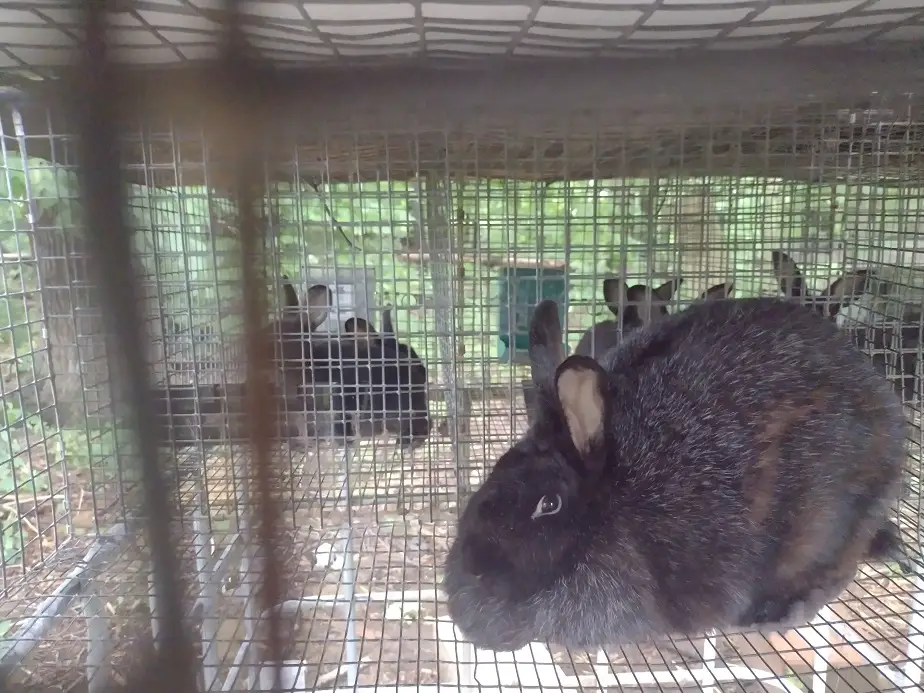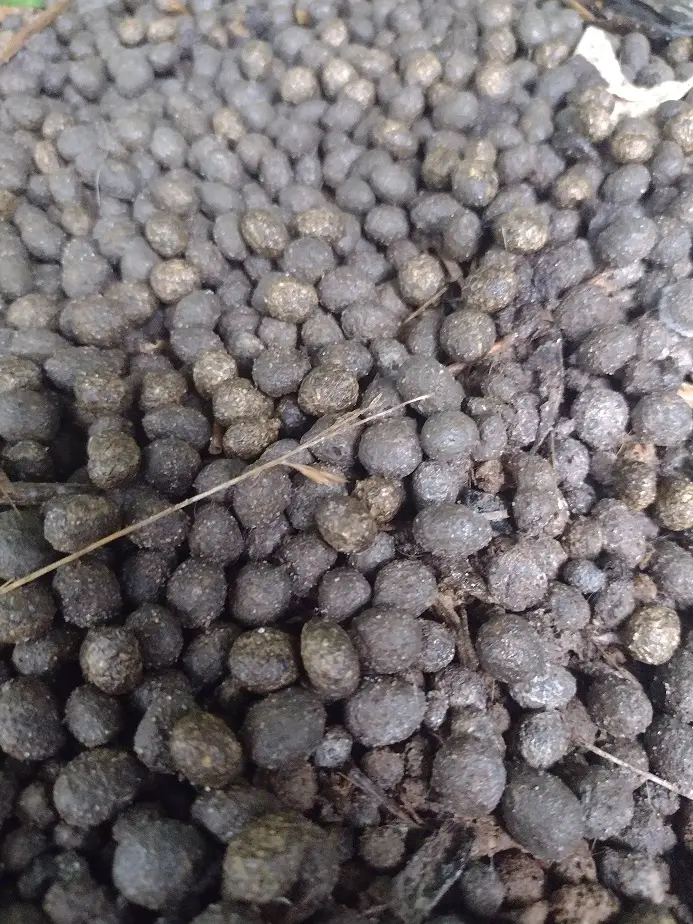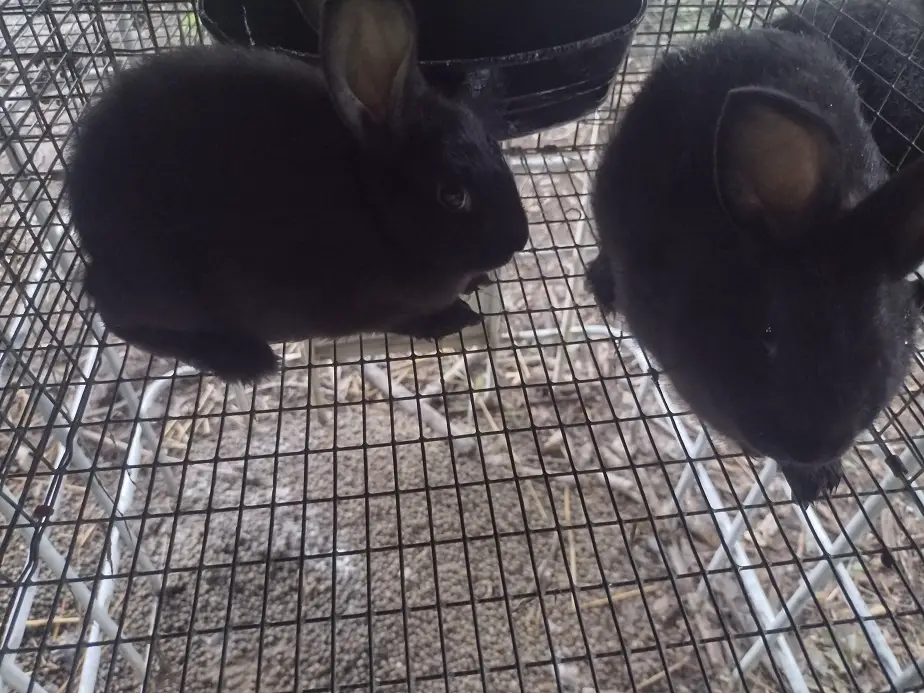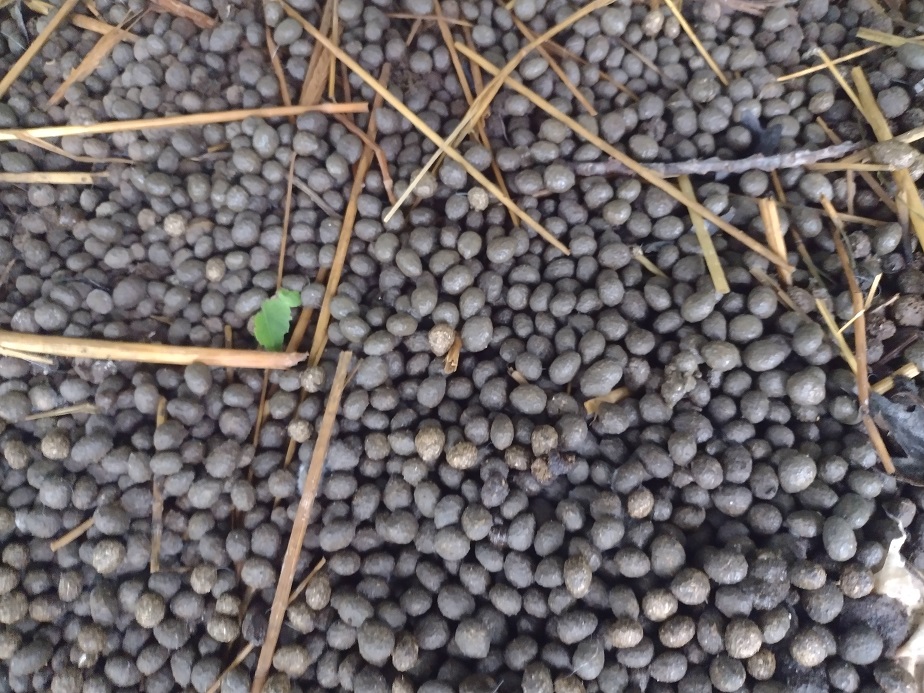We collect a lot of rabbit manure for the garden which works miracles in the soil.
Rabbit manure is an excellent organic fertilizer. It has an N-P-K value near 2-1-1. Rabbit poop can be applied to your garden every year. Apply up to 50 lbs. dry rabbit manure per 100 square feet of garden, then test the soil.
Rabbit poop is a super saver for organic home gardening. However, it is poop. There are safety precautions to take, as well as application methods and when to apply it. Read on for more!
What nutrients are in Rabbit Manure?
Which plant nutrients are in rabbit manure? Basically, all of them. Rabbit poop contains a pretty well-rounded mix of the macro-nutrients (N-P-K) and the micro-nutrients that plants need. Most rabbit manure tests an N-P-K between 2.5-1-1 and 1.8-0.7-0.7.
No, it’s not as strong as miracle grow (24-8-16), or the classic 10-10-10 fertilizer. It’s not as strong, but the ratio of N-P-K is pretty good. N-P-K stands for Nitrogen-Phosphorus-Potassium, which are the most needed nutrients for all plants. The ratio of those three is important.
Micronutrients are the 7 elements plants need in very little amounts. The micronutrients in rabbit manure will vary, depending on what’s in their food and water. However, even in the worst-case scenario, it has more than enough micro-nutrients for any plant.

Is Rabbit Manure Safe in my Garden?
People have expressed some concern about using manure in their gardens. Generally, the concern is about bacteria, parasites, or diseases passing from the animal and into the soil. It sounds like a legitimate concern. Let’s talk about this one.
The primary concern people have is about passing E. coli onto their garden produce. E. coli is dangerous. Fortunately for us, rabbits (due to their high-fiber low-grain diets) have very small numbers of E. coli in their gut. E. coli is a very small concern at best.
Another aspect of E. coli is that it is actually destroyed by “soil fauna”. That is, there are thousands of other organisms in the soil that will eat E. coli. E. coli also doesn’t reproduce well in soil conditions. One microbiologist advised me that any E. coli that transmits from manure to the soil is pretty much gone after 2 months.
That means that you won’t create a breeding ground of harmful bacteria in your garden by adding manure from any animal. in organic farming, the industry standard is to apply manure no less than one month from harvest for any produce. After one month, it’s considered safe to pick and eat.
It’s the same with salmonella. Rabbits aren’t oozing bacteria. What little they deposit in their feces is nothing more than the soil can’t balance out on its own. There are really no big concerns about it. Just rinse your produce before eating it.
If you have additional concerns about it, you can apply manure once a year, outside of the growing season. That way, by the time you are picking produce, it will have been several months at minimum from putting out the manure.
Now let’s talk about parasites. Parasites are disgusting. They are scary and weird. They can also be dangerous. Once again, fortunately for us, rabbits don’t have much of a problem with parasites. When raised off the ground and in a clean cage, rabbits very rarely ever have an issue with any parasite.
Lately, raising rabbits on the ground in a fenced-in area has become popular. That’s stupid. It greatly increases the rick they will get worms. Rabbits raised off the ground and in a clean environment; that also appear healthy, pose no credible risk of filling your garden with worms of any kind.
If you are one who simply doesn’t like to take risks, you can eliminate the risk by thoroughly drying it, heating it to 160 degrees, or hot composting it. that will kill any parasites that happen to be hiding in it.
Finally, about diseases. There are no known issues of a rabbit being able to spread any disease to a human. I have read that it may be possible, but it’s not been documented.

Will Rabbit Manure Burn my Plants?
I use rabbit manure straight from under my cages without drying it out first. I literally just toss it around the garden through ought the growing season. To date, I have seen no signs of anything ever burning my plants. And I’m talking 500 pounds of manure on 80 tomato plants. It’s safe to do.
The reason manure may burn plants is because of nitrogen. The nitrogen in manure (from the urine) is both perfect for plants and very unstable. It tends to break down from the uric acid, into a gas in the form of ammonium nitrate.
The ammonium nitrate, if strong enough, can burn the foliage of a plant while it is changing from a liquid to a gas. There are simple ways to totally prevent that. Dry it out, water it down, or let the ammonium evaporate. They all work. Most gardeners just dry it out.
If you dry it out quickly, within a day, you will lose very little of the organic Nitrogen and won’t have wasted any of the nutrients. Watering it down is generally done by mixing half a bucket of water with half a bucket of manure. If you mix it with a shovel or hoe, you will get a nice slurry that pours well.
After it’s watered down, no one can have any concerns about it burning anything at all. it will be completely safe for the most delicate of plants. Still, it’s always best to apply it to the soil, not the plant itself. Some plants damage easily by the force of heavy manure slurry.
Another method is to broadcast the rabbit manure across the garden, then just lightly water the plants to rinse off any potentially harmful chemicals. A lot of people use this method.
Remember, if a large pile of manure has collected under a rabbit, most of it is no longer fresh. It will not have as much Nitrogen left in it. it shouldn’t hurt any foliage at that point. If you do get the manure on the foliage, you can always rinse it lightly with your garden hose.
Just one final point. I worked on several local dairy farms. The farmers collected the manure and spread it before it was a week old. They wanted to spread it as fresh as possible, directly onto the growing wheat, beans, alfalfa, or oats.
Neither ever burned their plants. Rabbit manure in particular is completely safe to sprinkle around your plants. It will not burn them.
Does Rabbit Manure need to be Composted?
I won’t spend a ton of time on this point because I already touched on it previously. Composting rabbit manure to kill pathogens should not be necessary. Composting it so it’s not too strong is also not necessary. How about composting it so it breaks down quickly?
Rabbit poop comes in little pellets around ¼ inch in diameter. The poop pellets are made up of finely ground, then digested, plant matter. if you dry out rabbit poop, it will easily crush into a powder. When it gets wet (from watering or from the soil) the pellets soften and fall apart in a short time.
rabbit manure doesn’t smell like cow manure tends to. Cow manure can be awful because of how they digest their food. rabbit manure is not in big chunks like larger animals. it’s all ready to be incorporated directly into the soil. Just as it is, little round fertilizer balls, it’s good to use in the garden.
When to apply Rabbit Manure
You can apply rabbit manure to your garden any time you have some. If you want to till or rake it into the soil, it’s best done before anything is planted. Late fall after harvest, or early spring is good for that method. That way you won’t disturb your plants when you till it in.
If you are doing the liquid method, any time is fine. You can also just apply plain manure to the soil surface during the growing season and incorporate it after harvest when you should also till in the leftover plant matter from your garden.
I have an article all about using different types of manure in your garden. Here’s a link to it.

Acquiring or collecting Rabbit Manure
Our rabbit cages are elevated and have wire mesh floors so the manure falls to the ground. I scoop it with a shovel, fill the wheelbarrow, and haul a load of manure to the garden.
You can either raise your own rabbits or make a friend with someone who does. If you ask on a Facebook group, you’ll probably get results, but you may have to pay. There are a lot of folks who realize that gardeners want the “bunny honey” really bad.
Still, most rabbit owners would be more than happy for you to relieve them of their backyard pile of poo. There is someone selling it in three-pound bags on Amazon, for ridiculously high amounts. Price-wise, I often see it for sale for 20 bucks per feed sack full. That’d be around 20-30 pounds.
I raise my own rabbits. I like animals but not everyone can handle that. Ask your friends and relatives who own rabbits. Most likely, someone will let you clean their cages. My adult, non-breeding rabbits make about 2 pounds of manure a week, apiece.
An adult rabbit can weigh from 3 to 20 pounds, depending on the breed. The standard meat breed will produce about 1/3 pounds of manure a day. That’s for a mature, 10 to 11-pound rabbit. It’s more if it’s a pregnant or nursing doe. The amount of manure a group of rabbits will produce can be hard to figure.
Related Articles:

